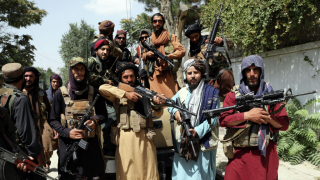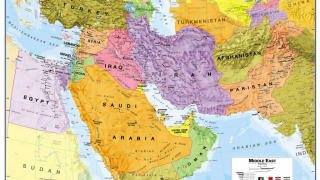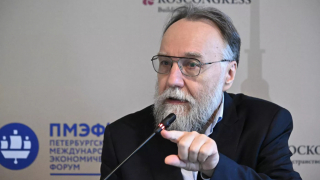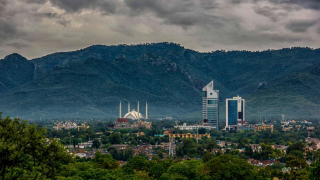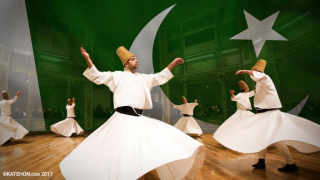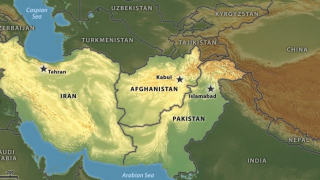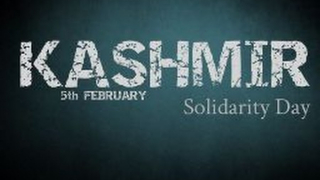The storm and the shadow of war: India and Pakistan on the verge of conflict?
In the recent weeks, suddenly all the world is watching again the region of Kashmir, divided in three parts (India, Pakistan and China). The military tension is rising up again in this region, with actions and counteractions from India and Pakistan. This escalation happened when Indian Air Force attacked Pakistani territory where allegedly were hidden members of terrorist group who days before committed suicide bomb attack against Indian army, causing around 50 casualties. After Indian retaliation against terrorists in Pakistani territory, Pakistani Air Force also performed counterstrike and since then, a lot of different news appeared, because Pakistan claimed the downing of three warplanes of India, India admitted only one downing while they claimed the downing of one warplane of Pakistan. These details are important but of course, this escalation is still more alarming because both India and Pakistan have nuclear missiles in their arsenals.
1. In this escalation many people are frightening because, where escalation will lead? We have seen previously that big wars started with one single action, but followed by retaliation and counterstrikes and so on. So, first question is: What we can expect next days? Will be more military actions across the border of Kashmir between India and Pakistan? And widely, this escalation can be spread to all borders between these two countries?
In order to understand the current level of escalation ladder in between Pakistan and India it is very important to empirically study the developments which took place in between the two since 14th February Pulwama attack. To analyse the current situation, it is important to divide these developments in to two timelines. One timeline starts from 14th February to 26th February when India conducted airstrikes in Pakistan and second from Pakistan airstrikes on 27th February to the present.
On 14th February, hardly few hours had passed since the Pulwama attack and no thorough investigation had been done by India and yet they resorted to blame Pakistan without any evidence. On the very next morning The Pakistan’s Ministry of Foreign Affairs said in a statement that the attack was a matter of "grave concern" and it had been condemning "heightened acts of violence in the (Kashmir) Valley… we strongly reject any insinuation by elements in the Indian government and media circles that seek to link the attack to the State of Pakistan without investigations”. On the same day Federal Information Minister Fawad Chaudhry said; “Putting the blame on Pakistan for everything is wrong, the normalisation process with India is our top most priority.” Pakistan’s information minister further said; “JeM is a banned organisation in Pakistan, we are taking action against it and will do whatever is required,” the information minister told India Today TV. The minister even offered Pakistan’s assistance in investigating the attack and seeks a dossier from India on 15th February which was not provided until 28th February. Prime Minister of Pakistan Imran Khan clearly said; “We had such an important visit of the Saudi crown prince coming up on 16th February. We knew that they would invest, there were contracts. Which country would sabotage such an important event by conducting a terror attack?”
During this time, Indian media was seen clearly beating the drums of surgical strike against Pakistan. Indian media was using tickers such as “we will not let Pakistan go scot-free”, “Pakistan has started an un-declared war on India” and “Pakistan’s defeat is inevitable” etc. This Indian media framing clearly suggests that Modi had intentions of the surgical strike against Pakistan after the Pulwama attack. In the midst of this crisis Pakistani sportspersons and actors were denied visas. Even within India anyone who tried to reject the notion of BJP and mainstream media about a possible surgical strike against Pakistan was condemned vehemently, a famous Indian cricketing legend and a host to a popular comedy show in India Navjot Singh Sidhu was ousted from “The Kapil Sharma Show” after he refused to sit on the India-Pakistan war bandwagon.
To Pakistan’s media and political analysts, Modi’s true intentions were plain and clear since the 14th February that Modi is intentionally trying to politicize the Pulwama attack to win the up-coming elections in May, 2019 through an all-time feasible tactic of framing Pakistan into every terrorist act inside India. To Pakistan it was “not pre-emptive but pre-election”. As far as Kashmiris are related Indian media have been doing a significant job since 2001 to frame every effort of the Kashmiri freedom fighters as “acts of terrorism assisted by Pakistan”. Same scenario can be easily assessed if we talk in the context of Pulwama attack. In addition to that, no main stream media and defence analyst in Pakistan was expecting that India would dare to come inside Pakistan for a surgical strike.
However, in the early morning of 26th February India Air Force violated the UN article 34 and 35 and intervened in Pakistan’s airspace. India claimed that it had conducted airstrike on terrorist camps in Balakot, Pakistan and killed 300 terrorists. The Indian Air Force violated the LoC for the first time since 1971; Pakistan in response proved that only a few trees were destroyed and no infrastructure damaged or people being killed. Pakistan asked India to show proofs on their claim of numerous terrorists being killed. The Indian Air Chief Marshal Birender Singh Dhanoa in a statement said; “We don’t count human casualties. We count what targets we have hit or not hit.” India was not able to provide any details of such number of causalities which means India was only doing an “information war coup” against Pakistan.
At the same time on the other side in Pakistan, with the Indian Air Force intervention the morale of the whole Pakistani nation went down and serious questions were being raised on the effectiveness of Pakistan Air Force (PAF) defence capability. The first two government officials to address the nation after the Indian violation of LoC were Foreign minister Shah Mahmood Qureshi and the spokesman of Pakistan Army Major General Asif Ghafoor who said it plain and clear that India had violated our airspace and Pakistan has the right to retorsion and will surely give a reply to India.
A day after India violated LoC, in the morning of 27th February Pakistan Air Force undertook strikes across the LoC from Pakistani airspace and shot down two Indian jets. During the dogfight in between Pakistan and Indian jets, one Indian jet with one pilot who ejected fell into Pakistan’s territory while the other fell into Indian occupied Kashmir. Pakistan Army and other security agencies were on high alert; Pakistan closed its airspace for any domestic and international flight. The Indian pilot “Abhinandan” was arrested by Pakistan Army on ground.
Indian Air Force was in such shock after the Pakistan Air Force strikes that it took them almost two days to hold a press conference. Foreign minister of India Sushma Swaraj instantly made a statement that “India does not want any further escalation with Pakistan”. Later, India accepted that their pilot is currently in the hands of Pakistan. Abhinandan remained into the custody of Pakistan security agencies for 40 hours until PM Imran Khan announced that he will release him as a goodwill gesture and for the sake of the overall peace of the entire region. His goodwill gesture was praised by everyone internationally that even the opposition of the Indian government welcomed his move. However, the BJP government and the Indian media refrained from accepting this development as a goodwill gesture on the part of Pakistan.
Now if we talk about the current ladder of escalation in between Pakistan and India, both India and Pakistan are currently engaged in cross border shelling since 26th February. Many soldiers and other civilians have been martyred and wounded as a result of this. Pakistan on 1st March told USCENTCOM, CDS UK, CDF Australia and Ambassadors of US, UK, China in Pakistan that “Pakistan shall surely respond to any aggression in self-defence”. Three days later we witnessed a strange phenomenon in the Arabian Sea when in the morning of 5th March, a Pakistani naval spokesman said; “Pakistan navy stopped an Indian submarine from entering our territorial waters, the Indian submarine was not targeted in line with the government’s policy of maintaining peace”. It was for the first time since 2016 Indian submarine was intercepted by Pakistan Navy.
It clearly shows that India through its private diplomacy with great powers such as US, UK, Russia and China is trying to imply that it does not want any further escalation but its unusual military movements being observed by Pakistan Army suggest that Indian Army is not in a mood for any de-escalation process with Pakistan. Security officials of both countries are in contact with each other however, PM Imran Khan had tried to call Narendra Modi for two times in the last week but he did not respond to the call to initiate peace talks. I am of the opinion that direct communication in between the government officials is essential for easing out the tensions, but I do not see it coming until the next Indian government in May/June. It makes sense why India is not willing for peace talks, firstly the kind of embarrassment Indian Air Force faced against a comparatively small Pakistan Air Force is somehow not been digested fully by the Indian establishment. Major western news outlets such as New York Times raised questions about the efficacy of Indian Air Force which lost a dogfight to Pakistan, resulting into more embarrassment and demoralization in the Indian Army.
I believe that Indian establishment is divided over further escalation against Pakistan. But there is going to be a significant number of officials in the Indian Army who are considering further escalation against Pakistan in an attempt to balance what happened with their Air Force. This is why after losing strategic advantage against Pakistan in the air they have changed their venue and now moved to the Arabian Sea to engage Pakistan in the waters. Pakistan wants peace not for itself but for the whole region, but if Indian Military continued like this then the current escalation ladder will surely increase in between in the coming days. A ground breaking recent intelligence report is being made public by Pakistan’s government which states that India is not the only country who is solely acting against Pakistan but Israel’s role and assistance is also evident behind the current India-Pakistan tensions. The government sources have recently handed over an intelligence report to a senior Pakistani journalist Hamid Mir from GEO News that; “Indian Military assisted by Israel had a plan for the missile attack on Pakistan, India had planned missile attack to various places in Pakistan including Karachi and Bahawalpur by using the Army base in Rajasthan, India. In the foiled missile master plan; Israel and another country (name not made public) were assisting India secretly. The security forces of Pakistan have shared the attack plan of India and Israel with friendly countries and also have shared the evidence with them.
Now the question arises why a Jewish state in the Middle-east would want to hit missiles in a Muslim Pakistan while making an alliance with Hindu India? This is an awesomely important question and the answer of it is little known to the non-Muslims. Here I would like to spend few minutes to decode this mysterious alliance. The state of Israel is not only in a strategic alliance with India (largest buyer of Israel’s weapons) but also in an ideological alliance with India as both follow and walks on the road for their respective golden ages in their surrounding world. Hindu India’s strategic thought is based on the idea of Hinduvta and the ideology of Akhand-Bharat (Greater India - which includes surrounding territories such as Pakistan, Bangladesh, Sri Lanka, Nepal, Bhutan, Eastern Iran and Maldives etc.) where once in the ancient times their gods and goddesses ruled the holy land of Bharat. Thus, Hindus believe that their history has reached to a last stage of four cycles of history (Kali Yug – the end of history) where one cycle of history is about to end and another cycle of history will replace it. Thus, secular nationalism must be replaced by religious nationalism (BJP/RSS prime moto) to transform secular India to more Hindu India in order to fulfil the religious obligation of Akhand Bharat.
Similarly, the Jews believe that their Messiah will not arrive nor its golden age until they expand their present geographical borders from the river of Nile to the river of Euphrates (Greater Israel - The Jewish holy-land which includes modern day Iraq, North-Western Saudi Arabia, Syria, Lebanon etc.) Therefore, for Israel it is essential to have hybrid war schemes such as ISIS/ISIL/Daesh, Jabhat Al-Nusra etc. in the Middle-east by the United States (influenced by the Israel Lobby in US and Israel itself) to fund and arm mercenaries to balkanize these surrounding Muslim states to enhance the security of the state of Israel in the Middle-east. To those, who still reject the notion that these state-sponsored terrorist groups are not being created by the intelligence agencies of United States and Israel we ask you a question; why ISIS have not yet attacked the state of Israel when we know that Jerusalem has always been a power centre of the Caliphate? It is really hard for secular minded scholars to answer this question because almost they all are being brainwashed through political theories and modern research methodologies to think in particular way that does not allow them to have a free thought.
If we talk about the dynamics of South Asia in the context of India’s quest for Akhand Bharat (Greater India) it becomes essential for India to fund and arm mercenaries in Afghanistan such as Tahrik-e-Taliban Pakistan (TTP – a terrorist group) Jamat ul Ahrar (JuA) and in Iran Jaish Al Adl (former Jundallah) to balkanize the whole West Asia in an attempt to prepare for its golden age in western hemisphere. This Indian strategy was exposed to the world when Pakistan’s Army caught R&AW’s agent Kulbhushan Jadhav from Pakistan’s province Baluchistan. Sadly, most of the analysts see these developments of Hybrid Warfare as proxies to contest for regional political and economic control, however very few are able to see the bigger picture that in reality; “it is an invisible war for the rival ideological systems”.
These two ideological systems of Hindu-Judaic civilizations rival to the ideology of Islam have found a common ground. Both Brahman Hindu and Judaic conception of the end of history is remarkably similar. Both the Jew and the Brahman Hindu consider themselves as the elite of human civilization and consider all non-Hindus or non-Jews to have been created with a lower status. Therefore both aim to establish geo-political and geo-strategic systems of superiority which will ensure that the elite of human civilization themselves would dominate over the rest of mankind. Both Hindu India and Jewish Israel, both civilizations with their only states in the world order have found a common obstacle in the quest for their golden age. And that enemy is Islam and its message which contradicts with the claims of Hindu and Jewish view of the movement and the end of history. Islamic civilization which is currently divided into nation-state system comprises of states surrounding Israel in the Middle East and states surrounding India in the South Asia such as Pakistan, Afghanistan, Iran, Bangladesh and Maldives etc. Hence, the establishment of an alliance between the Zionists who rule Israel today and the Brahman Hindu who rule India today is inevitable and has resulted into a nexus which is unbreakable in both war and peace. This explains the mysterious relationship and alliance between a Hindu India in the South Asia and a Jewish Israel in the Middle-east.
Therefore, the balkanization or denuclearization of a nuclear Muslim Pakistan is a common objective in between India and Israel. And it is not the first time that both India and Israel have joined hands together to crush Pakistan. Israeli air force was part of the plans to attack Kahuta research laboratories in in 1984 because it did not want to see an “Islamic Bomb” developed by Pakistan. Israel was supposed to lead this attack and not merely play the role of advising the IAF. Bharat Karnad has written that Israeli aircraft were to be staged from Jamnagar airfield in Gujarat, refuel at a satellite airfield in North India and track the Himalayas to avoid early radar detection, but Pakistan foiled the attack through a prior intelligence information similarly as it did a day ago.
Coming back to the current discussion, in the afternoon of 5th March, 2019 Pakistan announced to crack down and seize all the assets of UN recognized terrorist organizations such as Jaish-e-Muhammad and Jamaat-ul-Dawa. The brother and the son of the Masood Azhar (founder of Jaish-e-Muhammad) have been taken into captivity. It was announced by the government officials that Masood Azhar will also be captured soon. These initiatives are taken by Pakistan to normalize ties with India as Pakistan’s official position is to move towards the de-escalation process with India. It all depends on how the officials of each country communicate with each other for the peace of all in the region because a full out war is neither acceptable for India nor for Pakistan, however otherwise it may benefit and enhance the security of the Israel in the Middle-east.
2. There is a very big neighbour, China, which possesses a part of Kashmir (Aksai Chin) and also reclaims the Indian region of Arunachal Pradesh (in the North-East part of India). In this context, I know the significance of water in the Kashmir region, where China has built a lot of dams in its part, and India made the same in its Kashmir part, and meanwhile, Pakistan is suffering a lot because of this massive construction. And as we witness in the world, water is still more important that other resources as oil, because without water, no life can be. And also China has funded a lot of infrastructures in Pakistan during past years in order to protect the land communication of New Silk Road between the port of Gwadar and Chinese city of Kashgar. So, how do you see the position of China in this conflict?
Firstly, according to Pakistan’s strategic thought Kashmir is an integral part of Pakistan not just because of its strategic position being the vortex point of South Asia but also it has an ideological linkage because of the Muslim majority in Kashmir. Pakistan still holds the view that India is unjustly occupying Jammu and Kashmir against the will of the Kashmiris since 1947. Thus, Indian occupation of Jammu and Kashmir has always been condemned by Pakistan not only to raise voice for Kashmiris at the international level but also marginalize the Indian hegemony on strategic locations in Jammu and Kashmir.
Now if we pay close attention to the Kashmir conflict, India is not only squeezing Pakistan’s neck by committing atrocities against Kashmiri Muslims but also it is controlling water sources in Kashmir which is restricting the development of agriculture in Pakistan. It means as long as there is a Kashmir conflict peace cannot prevail in between India and Pakistan. India has numerous times scrapped Indus Water Treaty (1960) with Pakistan, by stopping the water flow inside Pakistan resulting in a draught which affected several rovers inside Pakistan. According to Indian strategists solving Kashmir issue means losing chess game to Pakistan because it will put Pakistan into a strategic advantage over India. Indian strategists are using Kashmir Conflict as double-edged weapon against Pakistan and they are aware that if there is going to be a plebiscite in Jammu and Kashmir, there is a high probability that majority will unite with Pakistan and naturally inherit a Muslim state with an already battle-hardened army with nuclear weapons.
If we talk about China and its role in the Kashmir conflict, Chinese stance has always remained unchanged. Chinese official position on Kashmir issue explicitly says that this issue must be resolved by both Pakistan and India. On one occasion Pakistani media had reported after a meeting on side-lines of the UN on September 22, 2016 between Prime Minister Nawaz Sharif and Chinese Premier Li Keqiang that the latter had said: “We support Pakistan and we will speak for Pakistan at every forum.” Two years ago in March 2017, the spokesman of the Chinese foreign ministry addressed this issue again and told that “the development of CPEC (China-Pakistan Economic Corridor) will not affect China’s stance on Kashmir issue, this conflict must be resolved by India and Pakistan. Apart from diplomacy if we talk in the context of strategy, both China and Pakistan have found a common ground against India when it comes to Kashmir conflict and their respective territorial claims.
In the aftermath of Pakistan’s airstrikes in India, China is currently trying to stress Pakistan and India to solve their issues through dialogue. China cannot afford a war between the two nuclear states in its backyard. Billions of Chinese money has been invested in Pakistan, according to military dimension of the Chinese strategy Pakistan provides a buffer to China against the NATO and US military presence inside Afghanistan. China will not allow any destabilization inside Pakistan. One of the prime examples of this phenomenon can found in 2011 when US allegedly killed Osama Bin laden in Abbotabad and accused ISI (Pakistan’s intelligence agency) for providing safe haven to Osama Bin Laden. There was a fog of war in between Pakistan and US, during the midst of this crisis after the killing of Bin Laden China made it clear to the world that “any attack on Pakistan Would be construed as an attack on China”.
On the other side of the coin, Chinese strategists are also aware that a destabilized or failed Pakistan will also result in an increase of Indian influence in South Asia. For example; the physics of South Asian geopolitics clearly suggests that if one eliminates Pakistan from the map of South Asia, small states such as Nepal, Bhutan, Maladies and Sri Lanka are likely to fall under the control or influence of India assisted by US. This is an alarming situation for China; Chinese Chicken Neck is its Xinjiang region which is mainly Muslim dominated and according to the Chinese perspective being influenced by foreign powers such as the United Sates for proxy purposes. Pakistan naturally closes the western south gate of China. Therefore balkanization of Pakistan means losing South Asia to US-India-Israeli axis. Thus efforts by the Chinese to bring peace in between India and Pakistan are in the interest of not only China, India and Pakistan but also to the overall peace of the world. China does not want any war with any country as it follows a foreign policy of good relations with all neighbours and economic integration with everyone.
3. Speaking about other neighbours, we can see to Russia and Iran. Russia has sold several modern weapons to India, and also has performed military exercises with Pakistan, and, in the same time is trying to create a multipolar world gathering in the first stage the most important Eurasian countries, as China, India, Iran, Pakistan, Kazakhstan amongst others in international organizations as SCO (Shanghai Cooperation Organization). And Iran has good relations with India, because India has funded infrastructures as the southern port of Chabahar. So, India and China are competing by proxy in Iran and Pakistan respectively. In this context, how do you see the position of Iran and Russia in this escalation?
First of all if we talk about Iran, Foreign Minister of Pakistan Qureshi was in contact with Iranian FM Jawad Zarif. Pakistan asked for Iranian help to resolve the current issue with India. As a result, Iran has offered mediation in between Pakistan and India however India has refused to become part of any peace dialogue. The spokesman of Pakistan Army Major General Asif Ghafoor hailed the Iranian move of mediation. Both Iran and Pakistan has always remained close allies, they are not only strategic partners but also they are ideologically Muslim countries.
However, sometimes Iran has shown its concerns over Pakistan’s tilt towards Saudi Arabia. Pakistan foreign policy always tries to balance Iran and Saudi Arabia. The occasional disruptions in between Pakistan and Iran cannot analyse by excluding what has been happening in Afghanistan since 1979 and in Baluchistan. The US wars since 1979 to present has contributed in the disruption of Pakistan-Iran ties. The separatist’s movements in both Iranian and Pakistani Baluchistan have only added fuel to fire. As a result of this, the two major countries who have benefitted from this strategic fault line in between Iran and Pakistan are US and India.
India knows that it cannot gain access to Afghanistan or to the Central Asian markets through Pakistan, thus initially engaging Iran into economic projects and later turning Iran against Pakistan through proxy warfare is an essential part of their grand-strategy. India did not become part of the China-Pakistan Economic Corridor (CPEC- third terminal point of the Chinese led Belt and Road Initiative) rather it is pursuing and implementing on the North-South corridor project which goes through Iran to Afghanistan and then to the Central Asia and beyond. Pakistan has long accused India of spreading subversion inside Pakistan through Afghanistan. However it came as a shock to every Pakistani when in March, 2016 an R&AW (Indian intelligence agency) agent was arrested by Pakistan Army from Baluchistan who used to come from the Iranian border to fund and arm Baloch separatists. The confessions made by the Indian agent named “Kulbhushan Jadgav” confirmed that he hid his true identity even from Iran. Among many, his prime task was also to disrupt Pakistan-Iran ties.
Indian led terrorism which spread from Pakistani to Iranian Sistan-Baluchistan region has resulted into confusions among Pakistan and Iran. Iran must be aware of the fact that the soul of the India’s strategy is “Chanakya’s Mandala Theory” which says that “your neighbour is your natural enemy and the neighbour’s neighbour is your friend”. But Iran being the Pakistan’s Muslim neighbour is merely used as a pawn to the ultimate Indian end game of achieving hegemony in the West Asia. Thus, it is essential for both Pakistan and Iran to be aware about the Indian games because a disruption in between a Sunni Pakistan and a Shia Iran is all what the enemies need to provoke conflicts and revolts on ethno-sectarian lines.
If we talk about Russia, Moscow is pursuing a balancing strategy not just in the context of Syrian war in the Middle-east but also in South Asia. In 2016, when Russia announced its first ever military drills “AMAN” with Pakistan, India showed its grave concerns over it. However, On August 13, 2017, a senior Russian military official announced that Moscow would host comprehensive joint military drills with India from October 19 to 29. This announcement received international attention, as Moscow’s October drills will coordinate with India’s army, navy and air force in a synchronized fashion for the first time. The timing of Moscow’s decision to expand its military cooperation with India is also interesting, as the drill announcement occurred just days after Pakistan held negotiations with Russia on the purchase of S-35 war planes.
Russia’s decision to increase its security partnership with India and Pakistan simultaneously is an excellent example of Russia’s balancing strategy in South Asia. Russia’s capability to maintain military partnerships with both India and Pakistan is fruitful for its broader geopolitical ambitions. Vladimir Putin supported India’s counter-terrorism operation in Kashmir after the 2016 Uri attacks and openly praised India’s counter-terrorism operations during his meeting with Modi in June, 2016. Even though Russia’s support for India’s counter-terrorism policies risks damaging its bilateral relationship with Pakistan, Moscow has eased concerns in Islamabad by highlighting Pakistan’s indispensability as a counter-terrorism partner in Afghanistan.
If we talk about the current tensions in between India and Pakistan it is unlikely that Russia will take sides as it has her stakes in both countries; this is why Moscow clarified both India and Pakistan few days ago to not to bring their dispute to the upcoming SCO summit. Russian Foreign Minister Viktorovich Lavrov reiterated offer of mediation and provision of venue for peace talks between India and Pakistan during a telephone call with his Pakistani counterpart Shah Mahmood Qureshi on 1st March. Foreign Minister Qureshi appreciated Russia’s balanced and constructive role in de-escalation of tensions in the region.
4. Watching more widely in the world, and in the history, we can check that in southern Asia happened a geopolitical change. Pakistan, former ally of USA, now is ally of China, the main threat of USA under words from Trump administration. Especially we have to remember the question of South China Sea. And India, former soviet ally, now is ally of USA. Thus, we make us the following question: Do you think that USA is backing India in order to escalate a conflict in Eurasia for causing troubles in the other side of China? Or shortly, do you think that India is playing the role of USA’s proxy?
Yes Mr. Enrique, indeed you have asked a very good question. If we as civilization think critically apart from using “nation-states or political perspectives” then we see that a strange movement of history is currently happening all around the globe. If we pay close attention to this movement of history in South Asia, then we see that this great transformation which has resulted into new strategic blocs took place soon after 9/11 and the US decision to wage a global war on terrorism. I call this transformation as “An Ideological Realignment of Alliances” in between the great powers.
Firstly, as far as China is concerned I have already provided you enough details why China believes that Pakistan provides it’s a buffer against the US and NATO military presence inside Afghanistan. However, to the nature of this question I would like to divert your attention to the subject of Chinese Uighur Muslims in Xinjiang province of China (Western) which are being exploited by the NATO secret Armies in Eurasia. They are currently under the code name “Operation Galdio” led by the US arming and funding Chinese Uighurs not only to destabilize China but also to transport these mercenaries to fight against Bashar Al Assad in Syria. This means that US strategy while sitting in Afghanistan is directed against both Pakistan and China. And the strategy is like a double edged as it not only trying to restrict Chinese economy through diplo-political moves but also it is destabilizing China and rest of the region through US led Hybrid warfare.
If we talk about in the context of Pakistan, Pakistan officially became part of the US coalition against terrorism during the President General Pervez Musharraf regime. Pakistan followed the same path to help US as it did in 1979 when Soviets intervened in Afghanistan. The only difference of opinion between US and Pakistan was that US did not want Afghan Taliban control over Kabul and Pakistan historically being ally of Afghan Taliban (former Mujahideens) wanted to have Taliban’s government in Afghanistan. Pakistan has long stressed on the view that Afghan Taliban is the by-product of what US jointly created with Pakistan during the Afghanistan War. Afghan Taliban has a significant number in Afghanistan to rule legitimately through a government. But US has never allowed it rather installed its puppet regimes since 2002 to continue its “neo-imperial” over Afghanistan... later during 2006, a wave of uncountable suicide bombings started inside Pakistan and security agencies of Pakistan tried to stop increasing destabilization of the country. The roots of the suicide bombings were traced back to FATA and Afghanistan by the law enforcement agencies of Pakistan; and in 2008 Pakistan security agencies after conducting several operations were fully aware about the Indian involvement along with United States in spreading terrorism inside Pakistan through proxies such Takrik e Taliban Pakistan, Balochistan Liberation Army and Jamaat ul Ahrar etc. This means the security agencies of these countries were using their agents and local mercenaries to configure subversion inside Pakistan.
Former DG ISI of Pakistan Late General Hamid Gul (the architect of Afghanistan War) was ridiculed by many in the early years of war on terrorism. He used to say on several occasions that “9/11 was an inside job by the US to unleash war against the remaining strong Muslim states, Afghanistan is being used by the United States and India as a base to attack Pakistan through proxy warfare, and their ultimate objective is to implode and denuclearize Pakistan”. Later, as time passed almost everyone realized the fact whatever Gul said was truth. It is plain and clear as a day light that United States is intentionally sustaining the Afghan Crisis to the disadvantage of Pakistan. Pakistan believes that the unholy trinity of CIA, RAW and NDS in Afghanistan is the sole cause of terrorism inside Pakistan.
5. I have to ask you about the Indian claiming that Pakistan is a country which is backing Islamic terrorism, and because of this, India is obligated to fight against terrorism by all means in order to protect Indian safety. This is very linked to common excuses from USA for attacking other countries in the world, but also we have to remember the historical use of terrorism by USA for fighting against USSR in the 1980’s. In that context, Pakistan took advantage of this terrorism in order to fight against India, then ally of USSR, but later Pakistan became a country torn by that terrorism generated by USA during Afghan war. But in recent years, Pakistan is fighting back against terrorist groups which even had Pakistani territory under control. What is the reality of Pakistan about terrorist charges made by India?
Firstly, India is adopting the same strategy of using so-called “Islamic Terrorism” as a pretext as US has been using since 2001 to balkanize the Muslim states. US Strategy in South Asia naturally fits with the Indian strategy against Pakistan. According to me, United States led Hybrid warfare in Muslim countries is aimed at enhancing the security of the state of Israel in the Middle-east. If one comprehensively studies the physics and metaphysics of war on terror, then it is not difficult to understand that United States’ wars in the Middle East and currently in South Asia naturally fits the grand objectives of the state of Israel and India. And US military has become a military arm for the state of Israel. American scholars such John Merisheimer and Stephen Waltz have comprehensively addressed this subject in their book “The Israel Lobby and the United States Foreign Policy”.
As far as India is concerned, India initially used the “frame of Islamic Terrorism” by Pakistan in the context of Kashmir since 2001. In the midst of these developments, India was able to capitalize on the Global War on Terrorism by framing the efforts of freedom fighters as Pakistan-led terrorism in Indian Occupied Kashmir. This is why; India managed to maintain the status quo in the Kashmir conflict as no further progress could be made between Pakistan and India in this regard. Since 2001, India’s stance on Kashmir remained consistent that it is an issue of terrorism.
India is using false flags such as Mumbai Attack, Samjhota Express, Uri Attacks and Pulwama attacks to isolate Pakistan internationally while simultaneously with the help of US from Afghanistan it is destabilizing the whole country. On 4th march, 2019 a ground breaking audio clip of BJP minister Amit Shah was leaked by Avi Dandiya (Indian Blogger) planning for a blast (Pulwama attack) in Kashmir to create war hysteria against enemy (Pakistan) in an attempt to win the upcoming elections in May. Amit Shah is clearly saying in the audio clip that we can deceive the public easily even if we have to kill our own troops. The BJP/RSS women talking to Amit Shah on phone call clearly says that if you say so then we can do a blast in Kashmir (Pulwama Attack) to start a conflict. She said if you can transfer the money on time, we can complete our work for a blast around 13th February. She further said an Uri like attack will do the job for us. Which means Uri attack of 2016 was also an inside job. India under Modi has not remained a secular India. India has become a more Hindu India which is trying to fulfil its religious duty of Akhand Bharat either by hook or by crook. Thus, blaming Pakistan for the terrorist activities who always accepts the reality of India is Disney lands stuff.
6. We have spoken about escalation and conflict but, I consider that the most of people in Pakistan and India don’t want to repeat previous wars as in 1948 or 1971, but, do the governments of India and Pakistan have opened conversations in order to know which the claims of each side are?
Yes it is true that majority of the people in Pakistan and India do not want war. Pakistan’s official position during this ongoing crisis is to de-escalate the tensions with India. Even after Pakistan’s airstrikes in response to the Indian aggression, #SayNoToWar was top trend on twitter India. Currently, Pakistan and Indian government officials are not in direct communication with each other however; on 28th February security officials of the two countries were in contact with each other to avoid any miscalculation.
It is important for both countries to engage in dialogue to ease out the tensions. So far the situation is suggesting that it is not in favour of Modi to open peace dialogue with Pakistan because his whole campaign against Pakistan will fail. And it will eventually result in his loss of upcoming elections in May, 2019.
7. Finally, what you can say to the world in order to deescalate this tension? How this conflict could be ended? Some sources are asserting that Kashmir must be independent country and this will solve the long conflict, but do you think that this is a solution or what other solutions could be?
The Kashmir conflict cannot be resolved through dialogue. From the Nimitz mission of the United Nations in late 1940’s to the present India has always rejected any move to resolve the issue of Kashmir through dialogue and plebiscite. India does not allow any foreign interference in its internal affairs, as explained above in detail according to Indian strategic thought; India considers states like Kashmir, Pakistan etc. as temporary security arrangements which were the bi-products of the British decolonization. It means these states are small units of that mother entity which is known as India/Bharat (Akhand Bharat). This is why India always asserts on the issue of bilateralism with its regional states. This is why SAARC as an organization has always failed.
If we talk in the context of an independent Kashmir, I am myself from Indian occupied Kashmir and my family migrated to Pakistan in the 1980’s to find a safe haven. The strategic implications of an independent Kashmir is very simple, an independent Kashmir will become a vassal state and a military base for the United States. We as Kashmiris want the peaceful Islamic system of governance not the Western Capitalist system of economy or its democracy. Socially, United States will change the fabric of our traditional Kashmir society and strategically, US will use the territory of Kashmir simultaneously against China in the North East and Pakistan in the South West. United States is directly behind the political mobilization and the traditional institutional decay in Jammu and Kashmir. They have been funding the political parties and as well as arming the militants to fulfil their own vested interests. They created Jammu and Kashmir Liberation Front (JKLF) for an independent Kashmir.
The solution to the Kashmir issue lies in the plebiscite, the right for self-determination must be given to the Kashmiris by India. Kashmiris are aware of the schemes against them by the key players in the region. The majority of the Kashmiris want to unite with ideologically same Pakistan. In doing so our Muslim community of Kashmir will naturally inherent a battle-hardened Pakistani army and socio-political apparatus. This may appear to India as unacceptable or equivalent to war, but for us it is PEACE.
Thanks a lot for your time and your answers!
You are most welcome brother Enrique. I have introduced different subjects during the interview which are worthy enough to be addressed in other exclusive interviews. I will be looking forward to more work with you. Thank you very much for reaching out, you are most welcome.



